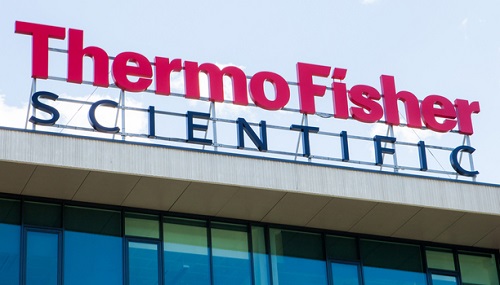
August 15, 2022 – The FDA has granted premarket approval to Thermo Fisher Scientific’s Oncomine Dx Target Test as a companion diagnostic (CDx) to identify patients whose tumors have a HER2 (ERBB2) activating mutations (SNVs & Exon 20 Insertion) in non-small cell lung cancer (NSCLC) who may be candidates for ENHERTU (fam-trastuzumab deruxtecan-nxki). ENHERTU is a specifically engineered HER2 directed antibody drug conjugate (ADC) being jointly developed and commercialized by Daiichi Sankyo and AstraZeneca.
The FDA approved ENHERTU on August 11 for the treatment of adult patients with unresectable or metastatic non-small cell lung cancer (NSCLC) whose tumors have a HER2 (ERBB2) activating mutations, as detected by an FDA-approved test, and who have received a prior systemic therapy. The approval follows a Priority Review, granted by the U.S. FDA in April 2022.
Lung cancer is the leading cause of cancer death among both men and women in the United States. For patients with metastatic NSCLC, prognosis is particularly poor, as only 8% of patients will live beyond five years after diagnosis, HER2-mutant NSCLC occurs in approximately 2-4% of patients with non-squamous NCSLC, and Enhertu is the first HER2-directed therapy for patients with NSCLC approved in the U.S.
“With care decisions increasingly made based on a tumor’s molecular profile, the FDA’s latest approval of ENHERTU in HER2 mutant metastatic non-small cell lung cancerand the additional approval of the Oncomine Dx Target Test as a companion diagnostic marks a significant step forward for precision oncology,” said Garret Hampton, president, clinical next-generation sequencing and oncology at Thermo Fisher Scientific. “To ensure patients and clinicians can readily access testing to inform care decisions, we are committed to making NGS accessible and easy to use so patients everywhere will be able to benefit from precision therapies, when indicated.”
The Oncomine Dx Target Test is currently the only distributed NGS CDx that has received regulatory approval and is available in 17 countries for 15 targeted therapies, covering more than 550 million lives globally. It is designed to simultaneously evaluate 23 genes associated with NSCLC. The test received its first approval by the FDA as a CDx in 2017. In the US alone, it is approved for seven targeted therapies for NSCLC and one for cholangiocarcinoma.
